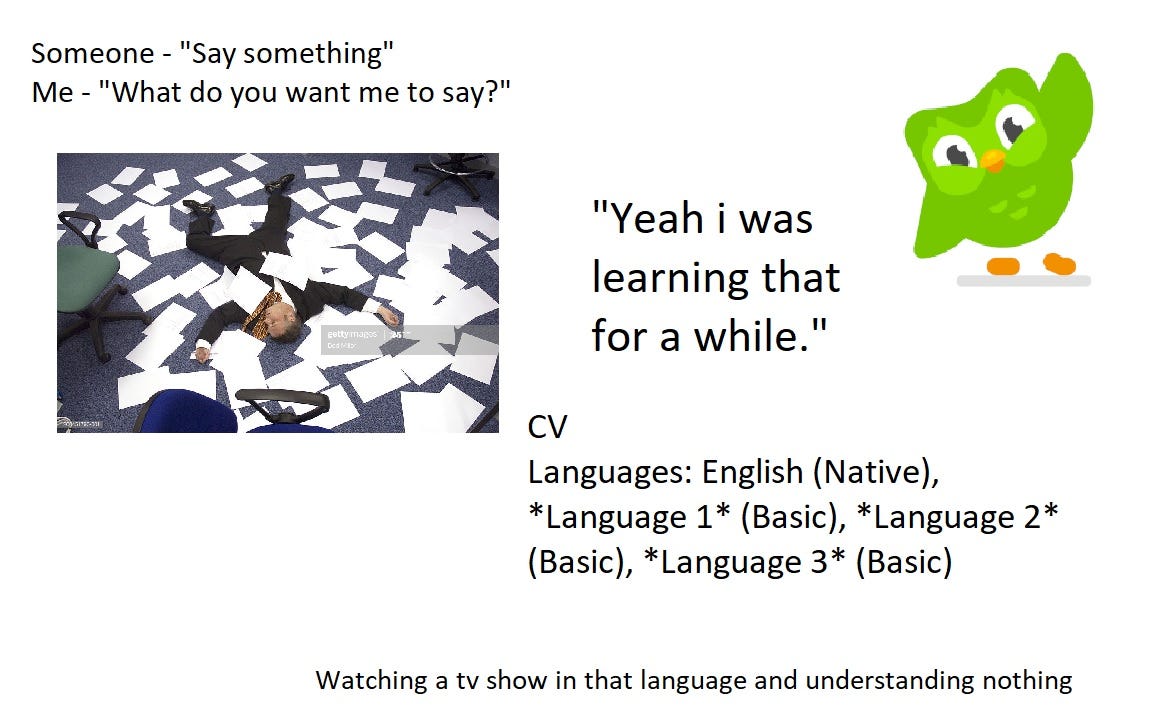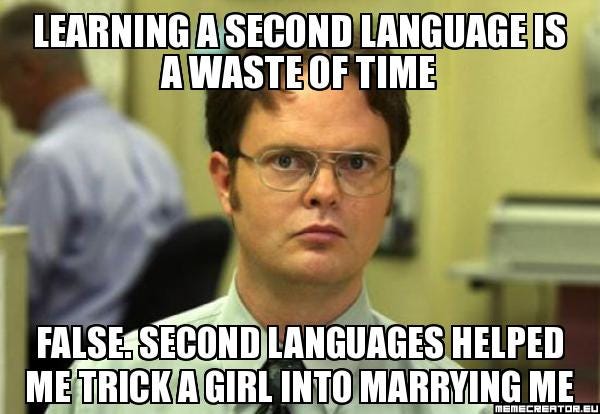The Second Language Acquisition Method You Missed Out On
Discover the power of doing things you enjoy
Welcome, aspiring polyglot! Recently there has been much discussion as to what is the most important for language learners to focus on when it comes to making the leap to speaking their target language. After working with a few new students, confidence seems to be the missing piece in the majority of situations. Even for those who have a large bank of vocabulary words and command of a variety of grammar structures, a lack of confidence can be destructive.
In order to speak you are going to need to build your confidence, but that is much easier said than done. For that reason, I wanted to take a moment this week to look at some simple things you can do to build some momentum and gain confidence in your second language abilities. Keep in mind, it will take time and you may have to start smaller than you like. Do not let that stop you from seeing how far you can go.
Talking about your daily life
This took me longer than I want to admit to accept, but people talk about the same things in every language. Anything you would or have discussed before in your native language is something you can immediately start working on learning to discuss in your target language.
Translating conversations is great, but you can get far more granular in open your world to an immense amount of new vocabulary words. You can also study the things that the people in your immediate environment tend to talk about and work your lessons around those things.
For example, if you work in an office with people you would like to talk to during your breaks, learning to discuss food is a good time investment. Everyone eats and most people like to talk about the things they eat.
If you are struggling to hold conversations throughout the day, learning to ask people about the things they like to eat is a great way to open the door to further conversations down the line. In all likelihood, you will spend more time listening to the people you are talking to than you will spend speaking.
At the end of the day, most people would rather hear themselves talk than listen to anyone else so you will have ample time to translate your thoughts and craft your sentence frames. Pay close attention to the things that people say and try to find ways to work their vocabulary words into your own lexicon.
Use the natural tendency of people to spend so much time talking about themselves to your advantage as you are learning a new language. Then, over time, learn to take chances when speaking, even if there is a chance that you are going to make a mistake, or many.
Beyond just food, try diving into the other things you enjoy. One of the most difficult parts about having conversations in foreign languages is starting conversations generally. Discussing the things you do habitually is a fantastic way to introduce new vocabulary words that will actually be productive for you.
Breaking down the language barrier by talking about the things you know well will help you build your confidence. The more language output you can work into your study sessions the better. Once you get beyond food, start looking at discussing your hobbies.
You never know when one of your hobbies will coincide with one of the people with whom you are speaking. Making a new friend and opening countless doors for future communication. However, it is possible that many people will struggle meeting people who speak their target language and that will make practicing spoken language quite a bit more difficult. In those moments you may need to think outside the box to other places where you might be able to get some quality practice in consistently.
When looking for other places to practice, there are a few you can consider, but don't spend too much time thinking on this. Pick one and try it. If you don't like it, try a different one and experiment until you find something you enjoy.
Twitter communities
Videogame servers
TV shows/Movies
Language meet ups
Local markets/restaurants
All of these places offer you the perfect opportunity to start speaking without too much pressure. Most of the mistakes you make in these arenas will either go unnoticed or be outright ignored. At the end of the day, you will always be your own harshest critic.
So going into these places with the intention of working on your second language acquisition without fear is vital. These are opportunities for improvement and no one is going to remember the random person they played a few rounds of games with and the mistakes they made while making an effort to speak a second language.
Feeling free to dream
After you get used to speaking about the present and the things you currently do, it is time to start dreaming. Thinking about what you could and should and would do in different circumstances. Learning the conditional is absolutely crucial and you will be using it consistently throughout your second language acquisition. While you will ideally work these things into your conversations, practicing with written language is a great way to set yourself up for successful conversations.
Keeping a language learning journal will give you the opportunity to gain clarity which will in turn make you more confident. The more precise you can be and the more completely you are able to express yourself, the better experience you will have when you are actually speaking. Building your confidence does involve writing, even if you do not want to be writing. Adding new words into your daily use through written language will take a layer of stress off the top.
Stress is destructive to confidence in the same way that exhaustion is. Writing everything down ahead of time and encoding it in your working memory will provide you with a little breathing room during the times you are face to face with a native speaker.
Escaping the silent period of second language acquisition means working to cultivate relationships, learn a new culture, and speak without fear of mistakes. Work in new vocabulary words in the form of different verb tenses so you are not isolated to a single moment in time. Talk about the future conditionally and with certainty.
As mentioned above, the most difficult piece of many conversations is starting them. As you do begin to cultivate relationships with native speakers, you will get to the point where they happen organically. However, when you are first getting started the ability to start a conversation with anyone at anytime may feel out of reach. If you are going to memorize anything memorizing various greetings in a foreign language is actually worthwhile. From there, it's all about mastering methods of asking open ended questions.
The importance of open ended questions
Mainstream classrooms focus a lot on the ability to ask and answer questions, but they rarely focus on taking people's language skills to a high level. Asking some questions is great, but asking open ended questions is how you make lasting, meaningful connections with other people in other languages. Trying to break down a language barrier with yes or no questions will feel tedious and can often have a negative impact on your confidence rather than a positive impact.
Start writing down any open ended questions you can think of that will give you an opening to start speaking with native speakers to practice your new language. Fortunately, much of what is discussed in your native language will also be discussed in your new language.
Do not over think this exercise. Write down questions and try to translate them directly from your native language to your new language. Translation is just a tool, but when you are working on ways to improve your listening skills and create an immersion environment it is irreplaceable.
Your final step to building confidence is mastering the concept of mental chess. Different languages flow in different ways, but conversations follow similar patterns. Focus on the things that are closely related when you develop your questions and sentence frames.
This, again, will involve writing, but in order to commit the new vocabulary words you are learning to your long term memory then writing all of the new words down is absolutely necessary. For more on mastering mental chess in your new language, and possibly even in your native language, check out this article:
Can you hear the voices?
Welcome, aspiring polyglot! People have been asking recently if it is possible to really think in a new language. The view around here is, of course, not only can you think in a new language, if you truly want to be bilingual you must think in a new language. While there are several approaches to getting to that point, there is one thing that works better than most others.
Conclusion
Confidence is paramount to success in second language acquisition. Even when you are speaking your first language, having confidence will affect how well you do in day to day conversations. Learning a new language takes this process to a whole new level as you are battling both a subconscious process and a conscious learning barrier you must overcome. Spoken language and written language vary, therefore you must practice both throughout the learning process if you want to be successful in your second language acquisition.
Discussing the things you talk about often in your first language will give you plenty of ammunition for things to discuss in your new language. Mainstream classrooms miss this portion of the learning process more often than they should and then they wonder why they consistently fail to successfully aid students in their second language acquisition.
Native speakers will be kind, but whenever you are learning a foreign language it is incumbent upon you to bring everything you have to it. This will, in turn, assure that the people you meet are more than happy to help you in any way they can. Although they may ask for your help perfecting their English language skills in return.
As we discuss often around here, creating is vital in second language acquisition. Speaking and practicing with written language will help you in accelerating and enhancing your language learning process, so start having conversations as early on as possible. It will be difficult, but you can do difficult things and be great. So go do some difficult things and become great.
Eager for more Second Language Strategies?
For more content find me on Twitter or Instagram. If you are struggling to get speaking in your target language, get up to 55% off a Babbel subscription using this link. I look forward to seeing everyone’s progress in the months and years to come. Don't forget to check out the YouTube channel as well!








